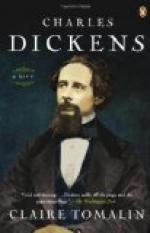So far his course of action was justifiable. Granted that it was judicious to notice the rumour at all, and to make his private affairs the matter of public comment, then there was nothing in the terms of the article to which objection could be taken. It contained no reflection of any kind on Mrs. Dickens. It was merely an honest man’s indignant protest against an anonymous libel which implicated others as well as himself. Whether the publication, however, was judicious is a different matter. Forster thinks not. He holds that Dickens had altogether exaggerated the public importance of the rumour, and the extent of its circulation. And this, according to my own recollection, is entirely true. I was a lad at the time, but a great lover of Dickens’ works, as most lads then were, and I well remember the feeling of surprise and regret which that article created among us of the general public. At the same time, it is only fair to Dickens to recollect that the lying story was, at least, so far fraught with danger to his reputation, that Mrs. Dickens would seem for a time to have believed it; and further, that Dickens occupied a very peculiar position towards the public, and a position that might well in his own estimation, and even in ours, give singular importance to the general belief in his personal character.
This point will bear dwelling upon. Dickens claimed, and claimed truly, that the relation between himself and the public was one of exceptional sympathy and affection. Perhaps an illustration will best show what that kind of relationship was. Thackeray tells of two ladies with whom he had, at different times, discussed “The Christmas Carol,” and how each had concluded by saying of the author, “God bless him!” God bless him!—that was the sort of feeling towards himself which Dickens had succeeded in producing in most English hearts. He had appealed from the first and so constantly to every kind and gentle emotion, had illustrated so often what is good and true in human character, had pleaded the cause of the weak and suffering with such assiduity, had been so scathingly indignant at all wrong; and he had moreover shown such a manly and chivalrous purity in all his utterance with regard to women, that his readers felt for him a kind of personal tenderness, quite distinct from their mere admiration for his genius as a writer. Nor was that feeling based on his books alone. So far as one could learn at the time, no great dissimilarity existed between the author and the man. We all remember Byron’s corrosive remark on the sentimentalist Sterne, that he “whined over a dead ass, and allowed his mother to die of hunger.” But Dickens’ feelings were by no means confined to his pen. He was known to be a good father and a good friend, and of perfect truth and honesty. The kindly tolerance for the frailties of a father or brother which he admired in Little Dorrit, he was ready to extend to his own father and his own brother. He was most assiduous in the prosecution of his craft as a writer, and yet had time and leisure of heart at command for all kinds of good and charitable work. His private character had so far stood above all floating cloud of suspicion.




